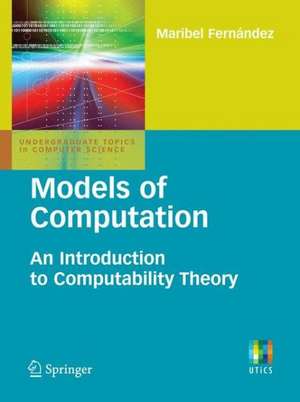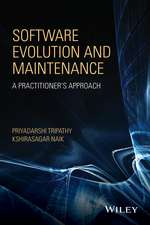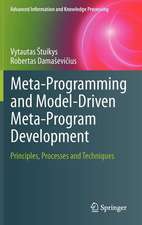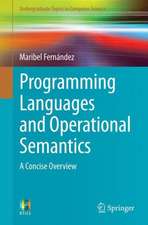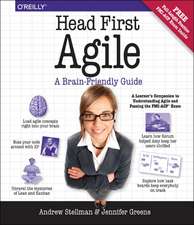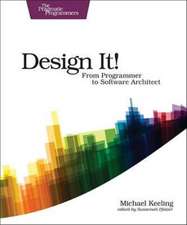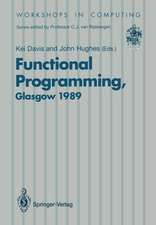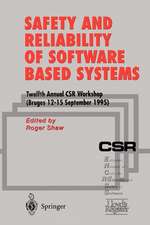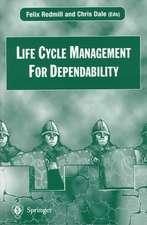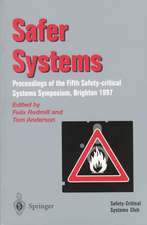Models of Computation: An Introduction to Computability Theory: Undergraduate Topics in Computer Science
Autor Maribel Fernandezen Limba Engleză Paperback – 21 apr 2009
Divided into two parts, the first highlights the traditional computation models used in the first studies on computability: - Automata and Turing Machines; - Recursive functions and the Lambda-Calculus; - Logic-based computation models.
and the second part covers object-oriented and interaction-based models. There is also a chapter on concurrency, and a final chapter on emergent computation models inspired by quantum mechanics.
At the end of each chapter there is a discussion on the use of computation models in the design of programming languages.
Din seria Undergraduate Topics in Computer Science
- 20%
 Preț: 341.22 lei
Preț: 341.22 lei - 20%
 Preț: 233.75 lei
Preț: 233.75 lei - 20%
 Preț: 318.98 lei
Preț: 318.98 lei - 20%
 Preț: 306.58 lei
Preț: 306.58 lei - 20%
 Preț: 187.22 lei
Preț: 187.22 lei - 20%
 Preț: 192.73 lei
Preț: 192.73 lei - 20%
 Preț: 280.93 lei
Preț: 280.93 lei - 20%
 Preț: 287.03 lei
Preț: 287.03 lei - 20%
 Preț: 305.61 lei
Preț: 305.61 lei - 20%
 Preț: 258.79 lei
Preț: 258.79 lei -
 Preț: 334.89 lei
Preț: 334.89 lei - 20%
 Preț: 246.39 lei
Preț: 246.39 lei - 20%
 Preț: 384.11 lei
Preț: 384.11 lei - 20%
 Preț: 272.43 lei
Preț: 272.43 lei - 20%
 Preț: 316.07 lei
Preț: 316.07 lei - 20%
 Preț: 245.43 lei
Preț: 245.43 lei - 20%
 Preț: 376.76 lei
Preț: 376.76 lei - 20%
 Preț: 350.89 lei
Preț: 350.89 lei - 20%
 Preț: 306.72 lei
Preț: 306.72 lei - 20%
 Preț: 374.37 lei
Preț: 374.37 lei - 20%
 Preț: 225.03 lei
Preț: 225.03 lei - 20%
 Preț: 226.65 lei
Preț: 226.65 lei - 20%
 Preț: 375.54 lei
Preț: 375.54 lei - 20%
 Preț: 395.05 lei
Preț: 395.05 lei - 20%
 Preț: 307.17 lei
Preț: 307.17 lei - 20%
 Preț: 254.37 lei
Preț: 254.37 lei - 20%
 Preț: 227.16 lei
Preț: 227.16 lei - 20%
 Preț: 304.37 lei
Preț: 304.37 lei - 20%
 Preț: 336.99 lei
Preț: 336.99 lei - 20%
 Preț: 316.24 lei
Preț: 316.24 lei - 20%
 Preț: 304.13 lei
Preț: 304.13 lei - 20%
 Preț: 342.46 lei
Preț: 342.46 lei - 20%
 Preț: 276.82 lei
Preț: 276.82 lei - 20%
 Preț: 237.35 lei
Preț: 237.35 lei - 20%
 Preț: 374.20 lei
Preț: 374.20 lei - 20%
 Preț: 304.44 lei
Preț: 304.44 lei - 20%
 Preț: 297.28 lei
Preț: 297.28 lei - 20%
 Preț: 579.37 lei
Preț: 579.37 lei - 20%
 Preț: 298.18 lei
Preț: 298.18 lei - 20%
 Preț: 243.35 lei
Preț: 243.35 lei - 20%
 Preț: 302.80 lei
Preț: 302.80 lei - 20%
 Preț: 297.66 lei
Preț: 297.66 lei - 20%
 Preț: 191.36 lei
Preț: 191.36 lei - 20%
 Preț: 278.11 lei
Preț: 278.11 lei - 20%
 Preț: 304.21 lei
Preț: 304.21 lei
Preț: 300.89 lei
Preț vechi: 376.11 lei
-20% Nou
Puncte Express: 451
Preț estimativ în valută:
57.58€ • 59.90$ • 47.54£
57.58€ • 59.90$ • 47.54£
Carte tipărită la comandă
Livrare economică 12-26 aprilie
Preluare comenzi: 021 569.72.76
Specificații
ISBN-13: 9781848824331
ISBN-10: 1848824335
Pagini: 196
Ilustrații: XI, 184 p.
Dimensiuni: 178 x 254 x 15 mm
Greutate: 0.34 kg
Ediția:2009
Editura: SPRINGER LONDON
Colecția Springer
Seria Undergraduate Topics in Computer Science
Locul publicării:London, United Kingdom
ISBN-10: 1848824335
Pagini: 196
Ilustrații: XI, 184 p.
Dimensiuni: 178 x 254 x 15 mm
Greutate: 0.34 kg
Ediția:2009
Editura: SPRINGER LONDON
Colecția Springer
Seria Undergraduate Topics in Computer Science
Locul publicării:London, United Kingdom
Public țintă
Lower undergraduateCuprins
Traditional Models of Computation.- Automata and Turing Machines.- The Lambda Calculus.- Recursive Functions.- Logic-Based Models of Computation.- Modern Models of Computation.- Computing with Objects.- Interaction-Based Models of Computation.- Concurrency.- Emergent Models of Computation.- Answers to Selected Exercises.
Recenzii
From the reviews:
"The focus of this relatively short book is on newer object-oriented and interaction-oriented models, including recent work in quantum computing and systems biology. … the book is designed for advanced undergraduate and graduate students. … Each chapter starts by clearly indicating what will be covered and ends with a series of exercises. … the book as a whole is extremely well written. Definitions are clearly stated … . Each model of computation is precisely defined, and the examples are clear and to the point." (K. Harrow, ACM Computing Reviews, September, 2009)
“It is a pleasure to see a book which takes a different approach to computer theory. … This short book can be used for a one-term course … . A valuable primer for students of programming languages. Summing Up: Highly recommended. Upper-division undergraduates and graduate students.” (P. Cull, Choice, Vol. 47 (3), November, 2009)
"The focus of this relatively short book is on newer object-oriented and interaction-oriented models, including recent work in quantum computing and systems biology. … the book is designed for advanced undergraduate and graduate students. … Each chapter starts by clearly indicating what will be covered and ends with a series of exercises. … the book as a whole is extremely well written. Definitions are clearly stated … . Each model of computation is precisely defined, and the examples are clear and to the point." (K. Harrow, ACM Computing Reviews, September, 2009)
“It is a pleasure to see a book which takes a different approach to computer theory. … This short book can be used for a one-term course … . A valuable primer for students of programming languages. Summing Up: Highly recommended. Upper-division undergraduates and graduate students.” (P. Cull, Choice, Vol. 47 (3), November, 2009)
Textul de pe ultima copertă
An Introduction to Computability Theory provides an introduction to the essential concepts in computability, using several models of computation, from Turing machines to the modern computation models inspired by quantum physics. It is addressed to advanced undergraduate students, as a complement to programming courses, or to postgraduate students interested in foundations of computation and the theory of computability.
There are two parts in the book. The first highlights the traditional models of computation used in the first studies on computability:
- Automata and Turing Machines;
- Recursive functions and the Lambda-Calculus;
- Logic-based computation models.
The second part covers object-oriented and interaction-based models, and includes a chapter on concurrency and a chapter on emergent models of computation inspired by quantum mechanics and systems biology.
At the end of each chapter there is a list of exercises, solutions to selected exercises are provided in the final chapter of the book. The book gives an in-depth analysis of the basic concepts underlying each model of computation. It privileges the understanding of the basic techniques and their relationships over simply describing their properties.
There are two parts in the book. The first highlights the traditional models of computation used in the first studies on computability:
- Automata and Turing Machines;
- Recursive functions and the Lambda-Calculus;
- Logic-based computation models.
The second part covers object-oriented and interaction-based models, and includes a chapter on concurrency and a chapter on emergent models of computation inspired by quantum mechanics and systems biology.
At the end of each chapter there is a list of exercises, solutions to selected exercises are provided in the final chapter of the book. The book gives an in-depth analysis of the basic concepts underlying each model of computation. It privileges the understanding of the basic techniques and their relationships over simply describing their properties.
Caracteristici
Provides an in-depth analysis of the basic concepts underlying the models of computation that underpin the most well-known families of programming languages
